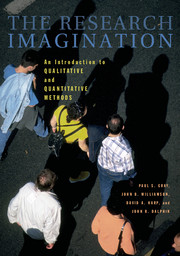Book contents
- Frontmatter
- Contents
- Preface
- 1 RESEARCH PROCESS
- 2 THEORY AND METHOD
- 3 RESEARCH DESIGN
- 4 MEASUREMENT
- 5 ETHICAL AND POLITICAL ISSUES
- 6 SAMPLING
- 7 SURVEY RESEARCH
- 8 INTENSIVE INTERVIEWING
- 9 OBSERVATIONAL FIELD RESEARCH
- 10 FEMINIST METHODS
- 11 HISTORICAL ANALYSIS
- 12 EXPERIMENTAL RESEARCH
- 13 CONTENT ANALYSIS
- 14 AGGREGATE DATA ANALYSIS
- 15 COMPARATIVE RESEARCH METHODS
- 16 EVALUATION RESEARCH
- 17 INDEXES AND SCALES
- 18 BASIC STATISTICAL ANALYSIS
- 19 MULTIVARIATE ANALYSIS AND STATISTICAL SIGNIFICANCE
- EPILOGUE: THE VALUE AND LIMITS OF SOCIAL SCIENCE KNOWLEDGE
- Appendix A A Precoded Questionnaire
- Appendix B Excerpt from a Codebook
- Author Index
- Subject Index
EPILOGUE: THE VALUE AND LIMITS OF SOCIAL SCIENCE KNOWLEDGE
Published online by Cambridge University Press: 05 June 2012
- Frontmatter
- Contents
- Preface
- 1 RESEARCH PROCESS
- 2 THEORY AND METHOD
- 3 RESEARCH DESIGN
- 4 MEASUREMENT
- 5 ETHICAL AND POLITICAL ISSUES
- 6 SAMPLING
- 7 SURVEY RESEARCH
- 8 INTENSIVE INTERVIEWING
- 9 OBSERVATIONAL FIELD RESEARCH
- 10 FEMINIST METHODS
- 11 HISTORICAL ANALYSIS
- 12 EXPERIMENTAL RESEARCH
- 13 CONTENT ANALYSIS
- 14 AGGREGATE DATA ANALYSIS
- 15 COMPARATIVE RESEARCH METHODS
- 16 EVALUATION RESEARCH
- 17 INDEXES AND SCALES
- 18 BASIC STATISTICAL ANALYSIS
- 19 MULTIVARIATE ANALYSIS AND STATISTICAL SIGNIFICANCE
- EPILOGUE: THE VALUE AND LIMITS OF SOCIAL SCIENCE KNOWLEDGE
- Appendix A A Precoded Questionnaire
- Appendix B Excerpt from a Codebook
- Author Index
- Subject Index
Summary
By now you have spent many hours reading about social investigation. You have been introduced to a new vocabulary of key terms and have become familiar with the search for “objectivity,” reliability, and validity. You have examined some of the ethical dilemmas of research. It is now time to take stock of what you have learned.
A CRITICAL PERSPECTIVE
Although this textbook may have increased your awareness of research methodology, you may not be pursuing a career in the social sciences. Many of you will never carry out your own research outside the context of a college classroom. Does this mean that the knowledge of methods is of no use to you? To the contrary, the same criteria used to evaluate social science research equip you to consider critically the wide range of assertions about social life that all of us read and hear daily. Knowledge of the obstacles to a sure understanding of society should enable you to develop a healthy skepticism toward the generalizations offered in the mass media, in literature, and in informal conversation.
Of course, we all make sense of our individual and collective experiences by making generalizations about the world. But it is important to realize that individuals are, in some measure, limited by the boundaries of their own experience. Our knowledge of social life emerges from the distinctive social positions we occupy, and our “realities” are constrained by our own life situations.
- Type
- Chapter
- Information
- The Research ImaginationAn Introduction to Qualitative and Quantitative Methods, pp. 433 - 438Publisher: Cambridge University PressPrint publication year: 2007

